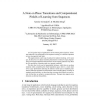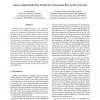270 search results - page 19 / 54 » Effective peer assessment for learning computer programming |
JIIS
2008
13 years 7 months ago
2008
An ever greater range of applications call for learning from sequences. Grammar induction is one prominent tool for sequence learning, it is therefore important to know its proper...
HICSS
2009
IEEE
14 years 2 months ago
2009
IEEE
One knowledge discovery problem in the rapid response setting is the cost of learning which patterns are indicative of a threat. This typically involves a detailed follow-through,...
PPNA
2011
12 years 10 months ago
2011
Several protocol efficiency metrics (e.g., scalability, search success rate, routing reachability and stability) depend on the capability of preserving structure even over the ch...
ATAL
2008
Springer
13 years 9 months ago
2008
Springer
We address the learning of trust based on past observations and context information. We argue that from the truster's point of view trust is best expressed as one of several ...
ISESE
2003
IEEE
14 years 1 months ago
2003
IEEE
Pair programming is a practice in which two programmers work collaboratively at one computer on the same design, algorithm, code, or test. Pair programming is becoming increasingl...


